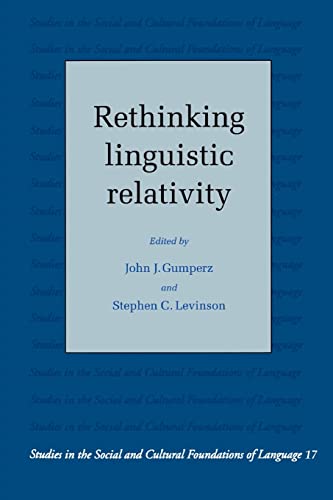rethinking linguistic relativity paperback von gumperz levinson (3 Ergebnisse)
FeedbackSuchfilter
Produktart
- Alle Product Types
- Bücher (3)
- Magazine & Zeitschriften (Keine weiteren Ergebnisse entsprechen dieser Verfeinerung)
- Comics (Keine weiteren Ergebnisse entsprechen dieser Verfeinerung)
- Noten (Keine weiteren Ergebnisse entsprechen dieser Verfeinerung)
- Kunst, Grafik & Poster (Keine weiteren Ergebnisse entsprechen dieser Verfeinerung)
- Fotografien (Keine weiteren Ergebnisse entsprechen dieser Verfeinerung)
- Karten (Keine weiteren Ergebnisse entsprechen dieser Verfeinerung)
- Manuskripte & Papierantiquitäten (Keine weiteren Ergebnisse entsprechen dieser Verfeinerung)
Einband
- alle Einbände
- Hardcover (Keine weiteren Ergebnisse entsprechen dieser Verfeinerung)
- Softcover (3)
Weitere Eigenschaften
- Erstausgabe (Keine weiteren Ergebnisse entsprechen dieser Verfeinerung)
- Signiert (Keine weiteren Ergebnisse entsprechen dieser Verfeinerung)
- Schutzumschlag (Keine weiteren Ergebnisse entsprechen dieser Verfeinerung)
- Angebotsfoto (Keine weiteren Ergebnisse entsprechen dieser Verfeinerung)
- Keine Print-on-Demand Angebote (3)
Sprache (1)
Preis
- Beliebiger Preis
- Weniger als EUR 20 (Keine weiteren Ergebnisse entsprechen dieser Verfeinerung)
- EUR 20 bis EUR 45 (Keine weiteren Ergebnisse entsprechen dieser Verfeinerung)
- Mehr als EUR 45
Gratisversand
- Kostenloser Versand nach Deutschland (Keine weiteren Ergebnisse entsprechen dieser Verfeinerung)
Land des Verkäufers
Verkäuferbewertung
-
Rethinking Linguistic Relativity (Paperback)
Verlag: Cambridge University Press, Cambridge, 1996
ISBN 10: 0521448905 ISBN 13: 9780521448901
Sprache: Englisch
Anbieter: AussieBookSeller, Truganina, VIC, Australien
EUR 74,97
Währung umrechnenEUR 32,30 für den Versand von Australien nach DeutschlandAnzahl: 1 verfügbar
In den WarenkorbPaperback. Zustand: new. Paperback. Linguistic relativity is the claim that culture, through language, affects the way in which we think, and especially our classification of the experienced world. This book reexamines ideas about linguistic relativity in the light of new evidence and changes in theoretical climate. The editors have provided a substantial introduction that summarizes changes in thinking about the Sapir-Whorf hypothesis in the light of developments in anthropology, linguistics and cognitive science. Introductions to each section will be of especial use to students. Linguistic relativity is the claim that culture, through language, affects the way in which we think, and especially our classification of the experienced world. This book reexamines ideas about linguistic relativity in the light of new evidence and changes in theoretical climate. The editors have provided a substantial introduction that summarizes changes in thinking about the Sapir-Whorf hypothesis in the light of developments in anthropology, linguistics and cognitive science. Introductions to each section will be of especial use to students. Shipping may be from our Sydney, NSW warehouse or from our UK or US warehouse, depending on stock availability.
-
Rethinking Linguistic Relativity (Paperback)
Verlag: Cambridge University Press, Cambridge, 1996
ISBN 10: 0521448905 ISBN 13: 9780521448901
Sprache: Englisch
Anbieter: CitiRetail, Stevenage, Vereinigtes Königreich
EUR 82,28
Währung umrechnenEUR 29,59 für den Versand von Vereinigtes Königreich nach DeutschlandAnzahl: 1 verfügbar
In den WarenkorbPaperback. Zustand: new. Paperback. Linguistic relativity is the claim that culture, through language, affects the way in which we think, and especially our classification of the experienced world. This book reexamines ideas about linguistic relativity in the light of new evidence and changes in theoretical climate. The editors have provided a substantial introduction that summarizes changes in thinking about the Sapir-Whorf hypothesis in the light of developments in anthropology, linguistics and cognitive science. Introductions to each section will be of especial use to students. Linguistic relativity is the claim that culture, through language, affects the way in which we think, and especially our classification of the experienced world. This book reexamines ideas about linguistic relativity in the light of new evidence and changes in theoretical climate. The editors have provided a substantial introduction that summarizes changes in thinking about the Sapir-Whorf hypothesis in the light of developments in anthropology, linguistics and cognitive science. Introductions to each section will be of especial use to students. Shipping may be from our UK warehouse or from our Australian or US warehouses, depending on stock availability.
-
Rethinking Linguistic Relativity (Paperback)
Verlag: Cambridge University Press, Cambridge, 1996
ISBN 10: 0521448905 ISBN 13: 9780521448901
Sprache: Englisch
Anbieter: Grand Eagle Retail, Fairfield, OH, USA
EUR 102,49
Währung umrechnenEUR 65,48 für den Versand von USA nach DeutschlandAnzahl: 1 verfügbar
In den WarenkorbPaperback. Zustand: new. Paperback. Linguistic relativity is the claim that culture, through language, affects the way in which we think, and especially our classification of the experienced world. This book reexamines ideas about linguistic relativity in the light of new evidence and changes in theoretical climate. The editors have provided a substantial introduction that summarizes changes in thinking about the Sapir-Whorf hypothesis in the light of developments in anthropology, linguistics and cognitive science. Introductions to each section will be of especial use to students. Linguistic relativity is the claim that culture, through language, affects the way in which we think, and especially our classification of the experienced world. This book reexamines ideas about linguistic relativity in the light of new evidence and changes in theoretical climate. The editors have provided a substantial introduction that summarizes changes in thinking about the Sapir-Whorf hypothesis in the light of developments in anthropology, linguistics and cognitive science. Introductions to each section will be of especial use to students. Shipping may be from multiple locations in the US or from the UK, depending on stock availability.


